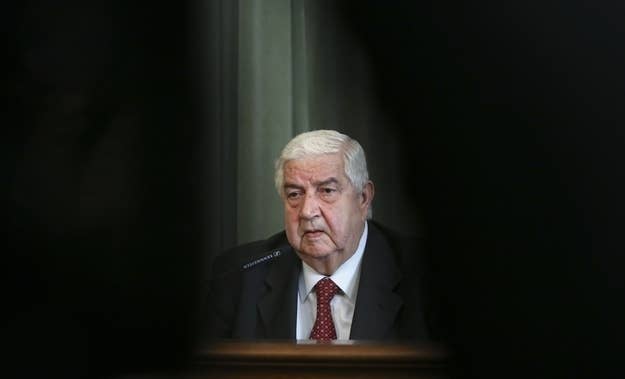
Updated - 3:50 ET
In an effort to "remove the grounds for American aggression," the Syrian government has agreed to a Russian plan to turn over its chemical weapons stockpile to the international community.
Syrian Foreign Minister Walid al-Moallem said Tuesday that Syria will sign a chemical weapons convention.
"We held a very fruitful round of talks with (Russian) Foreign Minister Sergei Lavrov yesterday, and he proposed an initiative relating to chemical weapons. And in the evening we agreed to the Russian initiative," Syrian Foreign Minister Walid al-Moualem said, according to Interfax.
But amid the growing enthusiasm that a diplomatic solution regarding Syria could be reached, Russian President Vladimir Putin said that a U.N. resolution to remove chemical weapons from Syria would have to include the U.S. rejecting any use of force.
During a Google+ hangout, Secretary of State John Kerry said Tuesday that a plan for the Syria give up chemical weapons would need the a United Nations Security Council Resolution to go forward. Kerry reportedly will meet with Lavrov in Geneva on Thursday to discuss Syria.
On Monday, Lavrov called on Syria to put its chemical weapons under "international control."
The call followed Kerry's remarks in London, during which he said, "Sure, [President Bashar al-Assad] could turn over every single bit of his chemical weapons to the international community in the next week ... But he isn't about to do it and it can't be done."
Jen Psaki, a State Department spokeswoman, later said this was a "rhetorical argument."
"[Kerry's] point was that this brutal dictator with a history of playing fast and loose with the facts cannot be trusted to turn over chemical weapons," Psaki said. "Otherwise, he would have done so long ago. That's why the world faces this moment."
France — which has thus far supported Obama's call to strike against Assad — announced on Tuesday that it would seek a U.N. Security Council resolution supporting the Russian proposal. China has also backed the proposal.
"We, the Russian side, are at the present time working on preparing an effective, clear, concrete plan, for which purpose contacts with the Syrian side are being conducted literally at this minute," Lavrov said at a press conference, according to Reuters. "We hope to present this plan in the very near future, and will be prepared to finalize it and work it out with the involvement of the U.N. Secretary General, the Organization for the Prohibition of Chemical Weapons (OPCW), and members of the Security Council."
A White House official confirmed conversations between Obama and French President Francoise Hollande and British Prime Minister David Cameron about the Russian proposal. The official said all three nations agreed to "explore seriously the viability of the Russian proposal" through a process at the United Nations that will begin today.
U.K. Prime Minister David Cameron has welcomed this plan with skepticism.
"The onus is very much now on the Russian government and the Assad regime to follow up in a way to show that the initiative is a serious and genuine offer," a Cameron spokesman said on Tuesday.
It's unclear how Syria's decision will immediately affect the Obama administration's response to Assad's apparent use of deadly chemical weapons on Aug. 21.
When asked whether the chemical weapons hand-off would change his mind about a strike, President Obama said, "absolutely."
"It's possible if it's real," he told CNN in one of a handful of interviews he gave about Syria on Monday. "I think it's certainly a positive development when the Russians and the Syrians both make gestures toward dealing with these chemical weapons. This is what we've been asking for not just over the last week or the last month, but for the last couple of years."
Senate Majority Leader Harry Reid announced he was delaying Wednesday's vote on a procedural motion to begin debate on the resolution to strike Syria. But in a joint statement on Monday, Republican senators John McCain and Lindsey Graham said they believe Congress should proceed with its plan to vote despite Russia's proposal.
"[Today's] development should make members of Congress more willing to vote yes," they said. "This will give the president additional leverage to press Russia and Syria to make good on their proposal to take the weapons of mass destruction out of Assad's hands."
The senators also laid out an alternate proposal for action, involving the U.N.:
"The only credible way for the Obama Administration to test this proposal is to immediately introduce a U.N. Security Council Resolution that spells out in clear, detailed terms exactly what the international community should expect of the Assad regime if it is serious about abandoning its weapons of mass destruction – weapons that it does not even admit to possessing at this point. Such a resolution must include specific requirements for immediate and intrusive inspections, unfettered international access to every site and suspected site in Syria possessing any weapons of mass destruction, guarantees for secure freedom of movement for all international inspectors, immediate steps by Assad to begin transferring his weapons of mass destruction to international custody, and clear consequences and triggers for action if obligations are not met by a time certain, among other commitments. Most importantly, this resolution must be presented as a take-it-or-leave-it offer and agreed to within a week at the Security Council, or else we run the risk that Russia and Syria will use this gambit as a way to play for time and continue the massacre of innocent men, women, and children in Syria."
The Syrian National Coalition, Assad's opposition, has said that Russia's proposal "fails to hold the Assad regime responsible for the killing of innocents" and "will lead to pointless procrastination and will cause more death and destruction to the people of Syria, and further threats to the countries and people of the region."
